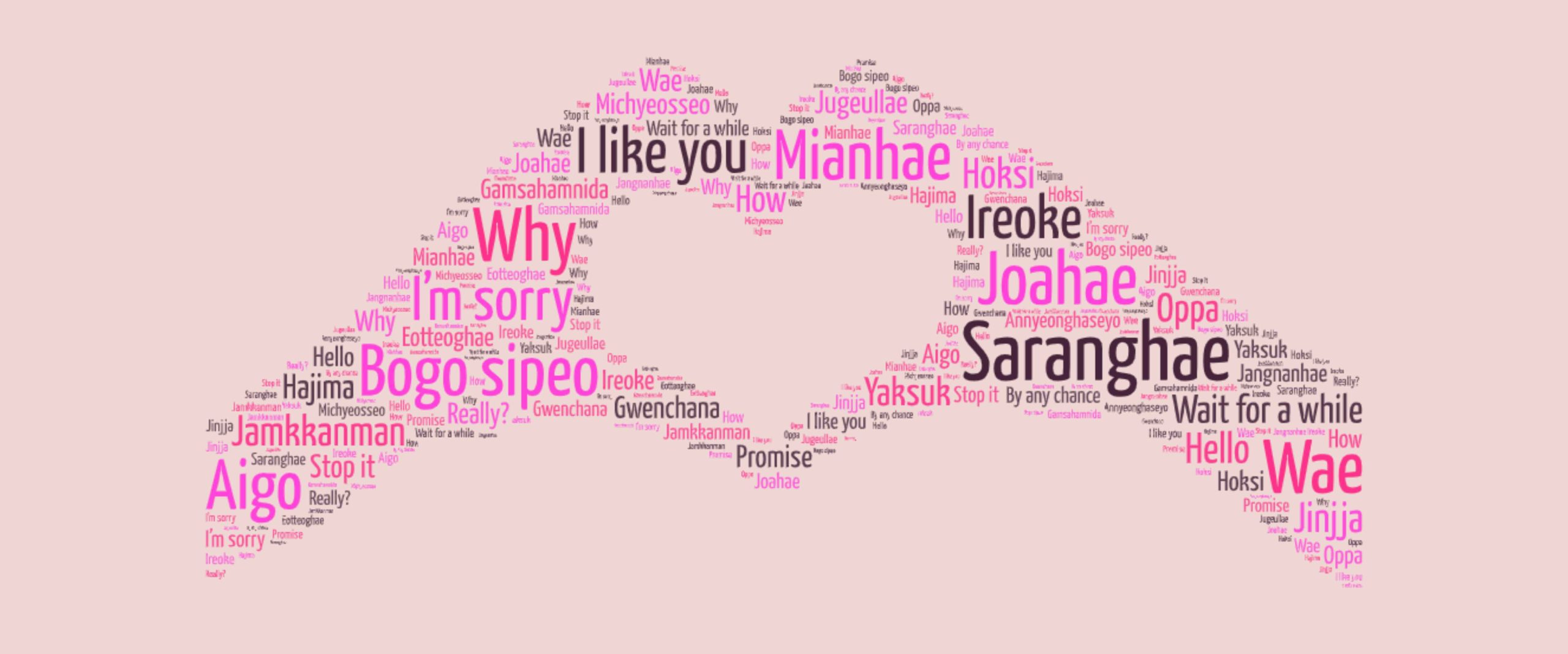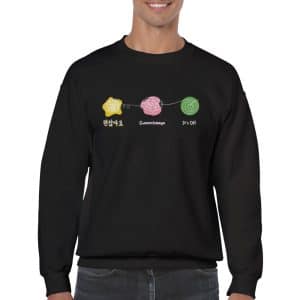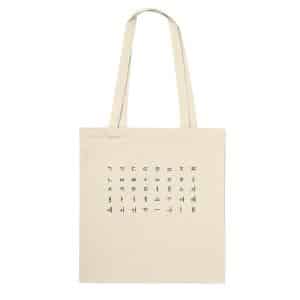Your basket is currently empty!
Most Popular K-drama Phrases
By
.

Whether you’re a die-hard K-drama addict or just dipping your toes into this world, there’s something undeniably unique about the Korean language, it’s practically calling your name! These shows are seriously addictive, one episode is never enough. Before you know it, you’ll binge-watch the entire K-drama in just a few days. It’s not just the gripping storylines and jaw-dropping plot twists that draw viewers in; it’s the thrill of picking up Korean phrases that pop up throughout. You’ll hear words so often that you’ll start piecing together their meanings without even glancing at subtitles. Imagine by watching just one drama, you could boost your Korean vocabulary by over 100 essential words and soon be enjoying episodes without any subtitles, now that’s a serious win!
So, if you’re ready to spice up your language skills, here are 20 popular K-drama phrases that every fan should have in their vocabulary. And if you want
Table of Contents
Popular K-drama Phrases:
1. Annyeonghaseyo – “Hello” in Korean:
“Annyeonghaseyo” is the most favourite K-drama phrase that everyone knows now. It’s the perfect way to say hello, especially when meeting someone face-to-face, and it’s mostly used as a respectful greeting for elders. It also refers to ‘Are you in peace’ and ‘may peace be upon you’. Even those who aren’t K-drama fans have likely picked it up from their K-drama-obsessed friends or during their own adventures in Korea. And let’s not forget the casual version, “annyeong,” which you’ll hear flying around in dramas between friends and close family.
2. Oppa – “An older brother to a younger woman” in Korean:
You’ve definitely caught those female leads calling their male partners or brothers “oppa” all the time, haven’t you? Traditionally, this cute little term is what women use for their older brothers, but thanks to that viral “Oppa Gangnam Style” song by PSY, it’s become a go-to for any close guy friend or older male figure in their lives. Just remember, it’s all about age so the men have to be older than the one calling them “oppa.”
3. Jangnanhae – “Are you kidding me?” in Korean:
Life isn’t always sunshine and rainbows, so our favourite K-drama characters have their moody moments too! Enter the Korean phrase “jangnanhae”, which can be a playful statement or a savage question. It’s the perfect way to say, “Are you kidding me?” and it’s usually tossed around among friends or with someone younger. While watching kdramas, you won’t find this being directed at anyone older or in a higher position, unless someone’s feeling a bit bold and rude, of course!
4. Hajima – “Don’t/Stop it” in Korean:
The go-to phrase for “Don’t!” in Korean is “Hajima”. It’s perfect for when you want to tell someone to stop what they’re doing—whether it’s a playful nudge or a serious order. You’ll hear it from K-pop idols and in K-dramas when characters are either teasing each other or trying to stop a friend from doing something silly. Just keep in mind, that it’s on the casual side, so make sure you’re using it with the right crowd and not some angry elderly!
5. Hoksi – “By any chance” in Korean:
“Hoksi” is one of those charming little Korean words that means “perhaps,” “maybe,” or “by any chance.” It’s perfect for when you want to ask something but keep it casual or polite. This word is often used at the start of a statement or question when someone has doubts about a certain topic. You’ll spot this popular K-drama phrase especially during those heart-fluttering moments when a character is nervously asking about their crush. Picture a scene where the lead shyly says, “By any chance, does he like me?”
6. Yaksuk – “Promise” in Korean:
“Yaksuk” stands for a promise, appointment, word, engagement, or undertaking a promise. We hear it all the time in K-Dramas, especially amongst a group of friends or “chingus” in Korean. This word is often used during pivotal moments that revolve around commitment and trust. Like characters setting crucial dates or making heartfelt promises to always have the other’s back, leading to those swoon-worthy moments we live for. So, the next time you spot a pinky swear followed by a “yaksuk,” you’ll understand instantly!
7. Jinjja – “Really?” in Korean:
In Korean dramas, when someone stumbles upon juicy gossip, you can bet they’ll say the word “Jinjja!” It’s like their way of saying “really,” perfect for chitchat with friends. But if you’re chatting with someone older or a stranger, it’s “jinjjayo.” Whether it’s surprise, shock, or even a little drama, this word is basic in everyday conversation.
8. Gamsahamnida – “Thank You” in Korean:
The next time you’re traveling to South Korea, you absolutely can’t forget this essential phrase: “Gamsahamnida” It’s the ultimate way to say thank you when you want to keep things polite. You’ll hear it all the time, especially in your favorite K-dramas, where politeness is the name of the game. Now, if you’re hanging out with friends or someone your age, just keep it chill with “Gomawo.” Trust me, mastering these phrases will make you feel like a local in no time!
9. Eotteoghae – “How” in Korean:
Here’s another must-know K-drama expression for you: “Eotteoghae.” This little word means “how,” and it’s used in everyday life. But wait, it’s also the go-to when someone’s feeling flustered after a blunder or trying to figure things out. You’ll also hear it as an expression, especially when someone is empathizing with another person.
10. Gwenchana – “Are You Okay?” in Korean:
If you’re a real K-drama fan, “Gwenchana” should be firmly etched in your memory. It’s one of the most iconic lines from the hit show ‘Welcome to Waikiki’ and still gets memed like crazy! It is used to check in on someone or respond when they ask if you’re okay. So, when someone says “Gwenchana?” you can confidently reply, “Nae, Gwenchanayo.”
Translation: Are you okay? Yes, I am fine.
-
 Gwaenchanayo – It’s Ok 괜찮아요 – K-drama Gwaenchanayo Sweater£24.71 – £29.71
Gwaenchanayo – It’s Ok 괜찮아요 – K-drama Gwaenchanayo Sweater£24.71 – £29.71 -
 Korean Hangul Premium Tote Bag£25.45
Korean Hangul Premium Tote Bag£25.45 -
 Annyeonghaseyo Hello Korean Gift Mug£15.82
Annyeonghaseyo Hello Korean Gift Mug£15.82
11. Jugeullae – “Do you want to die” in Korean:
When you hear the word “jugeullae,” it’s hard not to picture Jang Man-Wol from Hotel Del Luna delivering it with her signature straight face. This is a classic popular Kdrama phrase for when someone is seriously getting on your nerves. And if you want to be more savage, just add a “yo” at the end and suddenly it’s “jugeullaeyo?” as in, “Do you want to die?”
12. Michyeosseo – “Are you crazy?” in Korean:
“Michyeosseo” is a popular kdrama phrase that means ‘Are You Crazy?’ in English. It pops up in all the juiciest moments, think heated arguments or dramatic confessions. But beware, dear kdrama lovers! This informal term is considered highly rude unless you’re close to someone, so tossing it around in real life could earn you some serious side-eye. Use with caution, unless you want to spark some serious fights.
13. Ireoke – “Like this./Like this?” in Korean:
The Korean phrase “ireoke” is for asking how to do something or instructing someone on the right way to go about it. Literally meaning “like this,” it can also carry the vibe of “What should I do?” In K-dramas, you’ll hear it when characters are giving directions or double-checking if they’re on the right track. Picture this: in a cooking scene, one character might ask, “ireoke mandeureoyo?”, translating to “Should I make it like this?” Whether you’re giving advice or seeking guidance, this phrase has you covered!
14. Aigo – “Oh dear\OMG” in Korean:
You’ve definitely heard those old ladies or ajummas in K-dramas saying “Aigo” all the time, but do you know what it really means? “Aigo” is the Korean equivalent of “oh my god,” and it’s used for shock, frustration, confusion, and disappointment. You can bet there are countless scenes where characters blurt this out in the heat of the moment, making it a staple phrase of the drama!
15. Wae – “Why” in Korean:
The Korean word for “why?” is “wae?”, and it’s most commonly heard for asking questions and seeking explanations. You’ll hear it everywhere, from casual chats to serious talks. If someone bails on plans, the kdrama characters just ask a “wae?” to get the answer.
16. Jamkkanman – “Wait for a while” in Korean:
“Jamkkanman” is a popular Korean phrase that is usually used when you need someone to wait for you. It literally means “for a while” or “wait for a while.” If you’re chatting with someone older, just add “yo” to make it polite, turning it into “jamkkanmanyo”. Another classic variation is “jamsimanyo”, which also means “wait for a while.” You must have already heard both of these phrases all the time in K-dramas.
17. Mianhae – “I’m sorry” in Korean:
“Mianhae” is the casual way to say “I’m sorry” in Korean, and it’s a must-know, especially if you find yourself in trouble in the streets of South Korea. Trust me, you’ll pick it up effortlessly while binge-watching K-dramas. One of the most iconic moments for this phrase? After our leads have one of those dramatic, messy fights and then, after a sleepless night of reflection, they realize their mistakes and make those heartfelt apologies. Talk about top-notch romance!
18. Joahae – “I like you” in Korean:
Our favorite kdrama leads always need a little courage (and a few episodes) before they finally muster the nerve to say “Joahae” We’re all on the edge of our seats, just waiting for that moment! Also when chatting with the elderly or people you’re not super close to, always remember to add “yo” to keep it polite. So, when our K-drama heroes or heroines confess their feelings for someone older, you’ll hear “joahaeyo” instead. Those heart-stopping moments when characters admit they like each other are pure magic! No wonder “Joahae” is one of the first phrases you’ll pick up while diving into K-drama land.
19. Bogo sipeo– “I miss you” in Korean:
Let’s take a quick stroll down K-drama memory lane! Remember when Se-ri and Captain Ri had that epic reunion in Switzerland after all those years apart? The line “bogo sipeo” hit viewers right in the feels! Speaking of unforgettable phrases, “bogo sipeo” is one of the most popular ways to say “I miss you,” and it is perfect for your closest or loved ones. If you’re chatting with someone more casual, you’ll hear the longer version, “bogo sipeoyo.” However, we guess that you’ll pick it up in no time if you’re a true K-drama fan!
20. Saranghae – “I love you” in Korean:
“Saranghae” is the iconic phrase that translates to “I love you,” and it’s an absolute classic! One of the best things about romantic K-dramas is how they take their sweet time building those love stories before the characters finally spill their true feelings. That’s why “saranghae” is a must-know phrase for any K-drama fan. You might not hear it all the time, but when you do, trust me, it’ll hit you right in the heart!
Want to try these phrases in real shows? Check out our list of 2025 K-drama releases and see how many you can spot!
Where to Learn Korean:
Struggling to find time to learn Korean? Why not combine it with something you’re already doing, scrolling through social media? There are tons of Instagram accounts dedicated to helping Korean learners, so you can totally pick up the language without diving into online courses. These accounts break down grammar, share useful vocab, and even teach you some trendy slang to help you sound like a native. Ready to up your Insta game? Here are a few must-follow accounts!
For beginner-level content, check out @inakimiee.
Ready to learn Korean? You’re in great hands with Ina Kim! Her vibrant personality makes language learning a breeze, covering everything from handy phrases and grammar tips to cultural insights in eye-catching posts. In her videos, she shares basics like counting in Korean and grocery store vocab. Plus, for those wanting more, she offers Zoom courses and e-books. With Ina’s friendly approach, learners of all levels will feel confident with the language.
To make learning fun as well as perfect, check out @koreanjream_koreanteacher.
Jaerim is a total expert with a Ph.D. in Korean linguistics! She’s more than equipped to help you nail your pronunciation. Alongside her awesome pronunciation guide videos, she cleverly uses pop culture to break down the Korean language. So you can understand the meanings behind your favorite K-pop songs now!
To learn everyday phrases with perfect pronunciations check out @yeoni_korean.
This fab Instagram account is run by Jiyeon, a Korean teacher from Jeju! With her standard accent, she’s all about sharing everyday phrases and vocab, from sweet nicknames for your significant other to saying “long time no see.” Jiyeon’s here to help you sound just like a native Korean speaker!
To learn the Korean language with beautiful illustrations check out this amazing account @mykoreanchildhood.
This isn’t your typical Korean language teaching account! @mykoreanchildhood takes a creative spin by using their Korean heritage and language as inspiration for stunning Instagram artwork. The illustrations are not only adorable, but they also sprinkle in humor, retell classic Korean stories, and share the artist’s unique observations about the language. Plus, the Korean text isn’t your run-of-the-mill textbook vocabulary, making it perfect for learners looking to level up their language skills!
Some more Instagram accounts you can learn Korean from are:
1. @Spixy Korean
2. @koreanclass101
3. @korean_hamin
4. @hoonkorean
Conclusion:
This list is just a taste, but it’s helped many on their language journey! Start by reading Hangul, especially with your fave K-pop songs: they’re perfect for picking up popular phrases and pronunciation. Remember, practice makes perfect, so set your own pace and goals! For an extra boost, check out Go! Billy on YouTube and the famous Talk to Me in Korean courses to dive deeper. Learning Korean should be fun, so kick things off with our list, then hit those channels, and you’ll be on the fast track to success.

